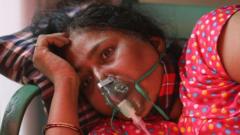In an unexpected turn of events, a distinguished panel of neonatal and pediatric specialists has openly questioned the 2023 conviction of British nurse Lucy Letby, who was sentenced for the murder of seven infants. Their findings suggest that crucial evidence used against her was fundamentally flawed.
Medical Experts Challenge Conviction of Nurse Lucy Letby

Medical Experts Challenge Conviction of Nurse Lucy Letby
An international panel has found no evidence supporting the murder conviction of Lucy Letby, raising serious questions about her trial.
On February 4, 2025, during a news conference in London, Dr. Shoo Lee—chair of the independent review—disclosed that the panel of 14 specialists conducted an extensive examination of 17 cases at the center of Letby's trial. Their conclusion was illuminating: they found no medical evidence to substantiate claims of murder or attempted murder linked to Letby. Dr. Lee emphasized that the review pointed to significant misunderstandings in the treatment and care of these vulnerable infants, many of whom had pre-existing health conditions that may have contributed to their tragic outcomes.
The panel dedicated its efforts pro bono and had full access to medical records related to the cases, illustrating the scope and seriousness of their investigation. Dr. Lee noted, “Some of the deaths were preventable,” indicating systemic issues within the neonatal unit's management. The findings not only raise doubts about Letby's guilt but also highlight the overarching responsibility of healthcare practices and protocols for high-risk infants.
Widely acknowledged as leading voices in neonatal care, the experts' insights could have profound implications for the legal and medical communities as they reconsider the events that led to Letby’s conviction. As the case unfolds further, it remains clear that discussions about malpractice, accountability, and the definition of care for the most vulnerable in society are critical.
The panel dedicated its efforts pro bono and had full access to medical records related to the cases, illustrating the scope and seriousness of their investigation. Dr. Lee noted, “Some of the deaths were preventable,” indicating systemic issues within the neonatal unit's management. The findings not only raise doubts about Letby's guilt but also highlight the overarching responsibility of healthcare practices and protocols for high-risk infants.
Widely acknowledged as leading voices in neonatal care, the experts' insights could have profound implications for the legal and medical communities as they reconsider the events that led to Letby’s conviction. As the case unfolds further, it remains clear that discussions about malpractice, accountability, and the definition of care for the most vulnerable in society are critical.






















